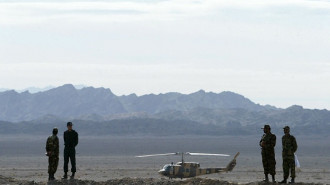France hosts Israeli, Arab officials at anti-terror conference
France hosts Israeli, Arab officials at anti-terror conference
France's justice ministry is hosting a gathering of judicial and security officials, including several from Arab states as well as Israel, to discuss international cooperation against terrorism.
2 min read
French Prime Minister Manuel Valls has been criticised for supporting "France's Patriot Act" [AFP/Getty]
Justice and security officials from 34 countries gathered in Paris on Monday for a conference to debate tackling terrorism in Europe, North Africa and the Middle East.
Attendees at the conference include Israel's State Attorney Shai Nitzan and senior Arab representatives - including justice department officials from Lebanon and Algeria, both of which do not have formal relations with Israel.
America's Deputy Assistant Attorney General Bruce Swartz will also attend, along with representatives of international organizations such as Eurojust, Europol and Interpol.
Tunisia, Morocco, Mauritania, Jordan and Egypt are all sending justice ministry officials to take part in the conference.
The Gulf states, Iraq and Yemen are notably absent, as the conference is primarily aimed at terrorist networks in north Africa and the Levant.
The conference will include debates on "mapping the terrorist threat", the relation between terrorist networks and organised crime, and the role of the judiciary in armed conflicts.
France's Justice Minister Christiane Taubira told "Le Parisien" on Monday that 39 judicial investigations into terror plots had been opened since the beginning of the year, mostly looking at networks involved with Syria, Iraq and Chechnya.
Last week French authorities arrested a man suspected of planning attacks against churches in the Paris suburbs.
Attorney General François Molins, who is a keynote speaker at the conference, told France Info radio on Monday that it was essential to strengthen international cooperation between justice departments.
"Terrorists don't respect borders. They use some countries to enter others. International cooperation on judicial matters is a major factor in the success or failure of investigations," he said.
"There are around 1,600 people being followed by the DGSI [France's intelligence service] because of their involvement in Syria."
The meeting comes as France's National Assembly debates a controversial law that would make it possible for the intelligence services to place someone under surveillance without the authorisation of a judge and could force Internet Service Providers (ISPs) to use mass surveillance technology against their customers.
Privacy International called the law "dangerous and broad", saying it would give unprecedented powers to the Prime Minister and allow the intelligence services "worryingly broad" ability to intercept electronic communications.
Attendees at the conference include Israel's State Attorney Shai Nitzan and senior Arab representatives - including justice department officials from Lebanon and Algeria, both of which do not have formal relations with Israel.
America's Deputy Assistant Attorney General Bruce Swartz will also attend, along with representatives of international organizations such as Eurojust, Europol and Interpol.
| French intelligence services are following 1,600 people suspected of involvement in Syria |
The Gulf states, Iraq and Yemen are notably absent, as the conference is primarily aimed at terrorist networks in north Africa and the Levant.
The conference will include debates on "mapping the terrorist threat", the relation between terrorist networks and organised crime, and the role of the judiciary in armed conflicts.
France's Justice Minister Christiane Taubira told "Le Parisien" on Monday that 39 judicial investigations into terror plots had been opened since the beginning of the year, mostly looking at networks involved with Syria, Iraq and Chechnya.
Last week French authorities arrested a man suspected of planning attacks against churches in the Paris suburbs.
Attorney General François Molins, who is a keynote speaker at the conference, told France Info radio on Monday that it was essential to strengthen international cooperation between justice departments.
"Terrorists don't respect borders. They use some countries to enter others. International cooperation on judicial matters is a major factor in the success or failure of investigations," he said.
"There are around 1,600 people being followed by the DGSI [France's intelligence service] because of their involvement in Syria."
The meeting comes as France's National Assembly debates a controversial law that would make it possible for the intelligence services to place someone under surveillance without the authorisation of a judge and could force Internet Service Providers (ISPs) to use mass surveillance technology against their customers.
Privacy International called the law "dangerous and broad", saying it would give unprecedented powers to the Prime Minister and allow the intelligence services "worryingly broad" ability to intercept electronic communications.

![Palestinians mourned the victims of an Israeli strike on Deir al-Balah [Getty]](/sites/default/files/styles/image_684x385/public/2024-11/GettyImages-2182362043.jpg?h=199d8c1f&itok=xSHZFbmc)


![The law could be enforced against teachers without prior notice [Getty]](/sites/default/files/styles/image_684x385/public/2178740715.jpeg?h=a5f2f23a&itok=hnqrCS4x)
 Follow the Middle East's top stories in English at The New Arab on Google News
Follow the Middle East's top stories in English at The New Arab on Google News
![Fakhrizadeh [AFP] Fakhrizadeh [AFP]](/sites/default/files/styles/image_330x185/public/media/images/774C39F7-8F7A-4D67-B998-27D102FCB4A7.png?h=d1cb525d&itok=j9eGvunV)

